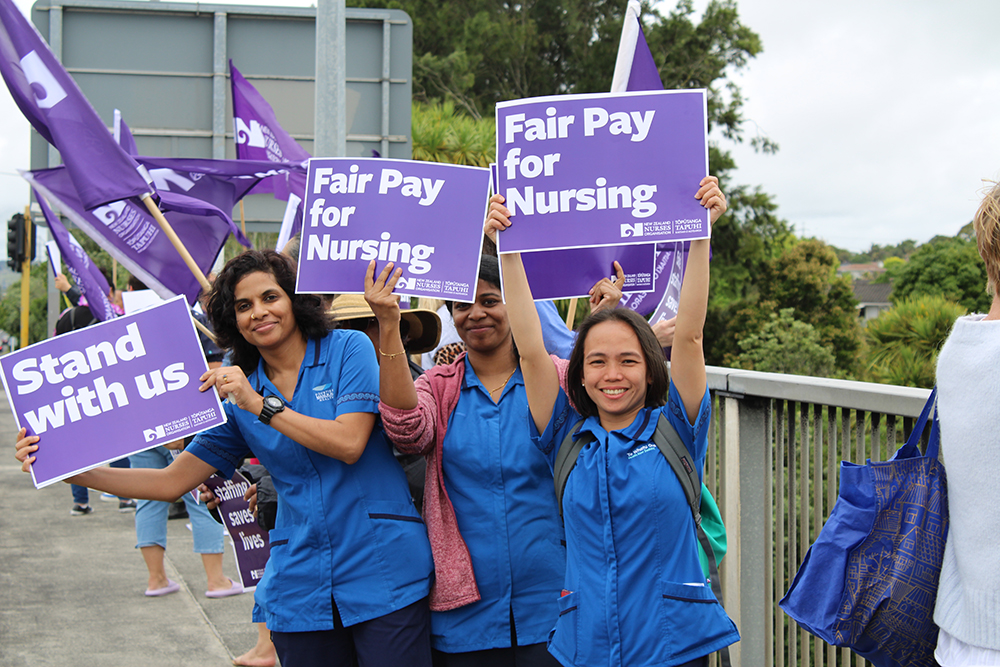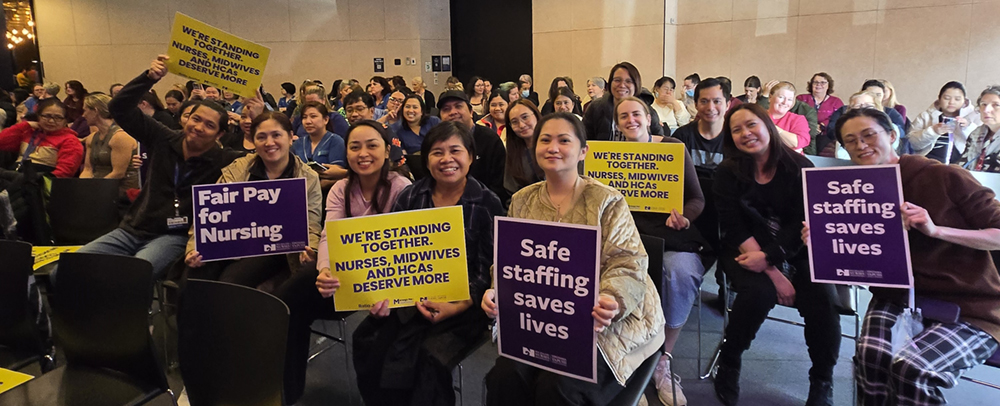At a glance: Key changes in latest offer
- A pay increase of two per cent, instead of one per cent, in 2026 — but in June instead of April. NZNO says it does not match cost of living.
- A three-month longer term for the collective agreement, which NZNO says will erode the value of the wage increase.
- A $325 lump sum payment (pro rata) in June 2025 and June 2026.
- A tikanga allowance has been removed with no explanation.
- A kaupapa Māori dispute resolution process has been removed with no explanation.
- Removal of shift coordinator allowance for members working 10 and 12-hour shifts — a move NZNO says is “nonsensical”.
- No further details on how it will prioritise safe staffing and use of the CCDM tool.
- Removed an obligation to consider evidence for nurse-patient ratio changes.
- No guarantee to employ new graduates.
A more detailed breakdown is available here.
About 36,000 Te Whatu Ora nurses and kaiāwhina around the country today voted to go on 24-hour strike, from 9am, Wednesday July 30, to 9am, Thursday July 31.
It follows an offer from Te Whatu Ora that — after 10 months of bargaining — failed to secure safely staffed hospitals, cost-of-living pay rises or support for New Zealand-trained nurse graduates.
‘There was no way we were going to take that offer. We’ve come so far on pay equity and this is just taking us right back.’
Nor did it offer nurses working longer shifts any extra pay for taking on supervisory duties.
Wellington nurse and NZNO delegate Mel Anderson said it was even worse than Te Whatu Ora’s May offer, which members rejected.
“There was no way we were going to take that offer. We’ve come so far on pay equity and this is just taking us right back,” she told Kaitiaki.
Te Whatu Ora’s continuing refusal to implement safe nurse-to-patient ratios was hard to understand, she said.
“It’s just so crap, there’s nothing. They’ve just taken everything away that was wanted by the members,” Anderson said.
In the latest offer, shift coordinators would only get paid for an eight-hour shift — not longer ones.
“I just can’t believe it — why they think nurses doing 12-hour shifts want to do four hours of shift coordination and not being paid for it! I don’t even have words for that.”

Nurses were feeling “disrespected”, she said. “We’re disappointed — and we’re angry now.
“We can see that the health system is crumbling around us and they don’t even seem interested in negotiating with us.”
Lack of support for new graduates
Anderson said a lack of support for graduates was also disappointing, after NZNO pushed for full employment of New Zealand-trained nurses.
“On my ward alone, we’ve had no students this year and it’s so upsetting for me that we’re not growing our own nurses,” Anderson said.
“We’ve had such amazing students come through and I’m just so disappointed for them.”

Last year Te Whatu Ora employed just over half of new graduates at end of year, compared to previous rates of about 90 per cent.
This week chief nurse Nadine Gray publicly urged nursing graduates to look beyond Te Whatu Ora for work — signalling there may not be many supported-entry roles for mid-year graduates about to hit the job market.
Whangārei nurse and NZNO delegate Chantelle Thompson said the biggest issue for everyone she spoke to was the lack of care for safe staffing, more than pay.
“It’s not necessarily to do with a lack of pay increase, but more around the lack of care for safe patient-to-staff ratios, a lack of understanding and care for the need for more funding to put into the health system for better services, resources, staffing.”
Workers were feeling “strong and collective in our thoughts to stand together and fight against this ridiculousness this Government seems to keep pushing on public services, us being included”, Thompson said.
“One of the biggest things is feeling very undervalued and that our public health system doesn’t matter.”
Christchurch health-care assistant (HCA) Michelle Genet – an NZNO delegate at a Te Whatu Ora-owned aged care facility — said serious strike action was overdue.
“We’ve had enough of Te Whatu Ora taking its time replacing workers, relying on casuals and delaying on advertising positions. They are putting all of us, especially our vulnerable residents, at risk,” she said.
“It is not safe and if this nonsense continues, a lot of our HCAs and nurses will not stick around. Several of them have already left for overseas.”
Genet said it was likely that family of the residents would be approached to feed the residents during the 24-hour strike.
‘It is not safe and if this nonsense continues, a lot of our HCAs and nurses will not stick around. Several of them have already left for overseas.’
“The families of our residents understand our situation – they know we are asking for things that will only mean better care for their loved ones.”
‘Patients at risk’
NZNO chief executive Paul Goulter said Te Whatu Ora had failed to address NZNO’s safe staffing concerns which had been repeatedly raised during negotiations over the past nine months.

This was despite data obtained by NZNO showing 50 per cent of all day shifts were understaffed in hospitals across 16 districts, he said.
“Patients are at risk because of short staffing. Nurses, midwives and health-care assistants are stretched too thin and can’t give patients the care they need. This is heartbreaking for our exhausted members who became health-care workers because they want to help people,” Goulter said.
A pay offer which failed to match the cost of living would do nothing to stop more nurses and health workers moving to Australia in search of better paid work, following in the footsteps of 30,000 who left over the past year, he said.
Te Whatu Ora ‘disappointed’
Te Whatu Ora acting chief executive Robyn Shearer said the organisation was disappointed by nurses’ decision to strike over its “reasonable” offer and concerned about the impact on patients.
The reality was Te Whatu Ora was operating within “tight financial constraints”, she said, adding that in the past 14 years nurses’ salaries had outpaced the broader labour market.
She urged NZNO to return to bargaining.
Goulter has previously admonished the organisation for conflating a 2023 pay equity settlement over long-standing gender-based inequities with collective agreement pay bargaining.





